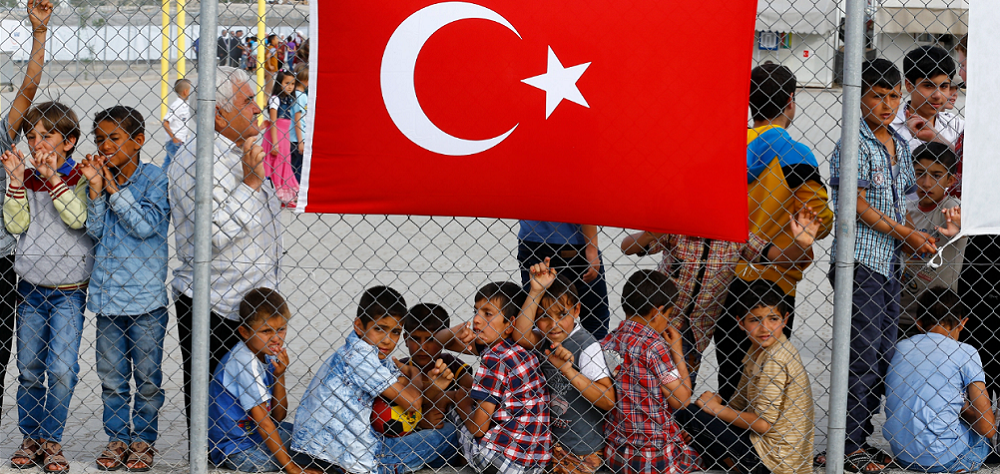Alwaght- Playing with the Syrian refugees’ card to wrest political and economic privileges from the West and Syria over the past 11 years, Turkey has a new plan for the displaced Syrians it is hosting.
The Turkish President Recep Tayyip Erdogan recently said that "our doors are open to them and we would continue to host them. But they can return home whenever they wish."
These remarks follow others in which Erdogan had said that Ankara has a voluntary return plan for one million Syrian refugees and it would be implemented by local councils in 13 Syrian regions including Azaz, Jarabulus, and Tal Abyad.
Such statements show that Turkey has not yet changed its policy towards Syria and continues to pursue its ambitious policies in the war-hit nation. Despite the claims of the Turkish authorities, the new plan will not be adopted easily and even it is not possible to implement in the current situation because the local councils in northern Syria and the southern Turkish authorities have not yet issued such a permit, and they are worried about crises that may occur in the implementation process. The infrastructures have not been completed yet, and the relocation of hundreds of thousands of refugees to northern Syria will increase insecurity more than it helps alleviate the crisis.
Refugees transfer challenges
Having in mind that this transfer is planned to take place without coordination with the legal Syrian government, its implementation would not go without challenges. Because Ankara's officials are still insisting on their previous policies towards Damascus after 11 years and so there would be no good to the Syrian people.
Turkey's officials have recently said that they did not change their position to the Syrian government, and so a reconciliation is far from imagination between the two countries, though larger opposition to Erdogan's Syria policies while Turkey is a year away from the election can force the president to review his policies, namely the same thing he did towards Saudi Arabia and the UAE. But at least for now, this would not happen.
On the other hand, there are many challenges in transferring the refugees. With the return of Syrian refugees, European countries that have been thinking of returning Syrians home for years will be encouraged to take similar steps, and the sudden return of millions of Syrians at a time when the country is still grappling with a social crisis will create difficult conditions.
Moreover, given the fact that the Syrian refugees have been away from home for many years, it will not be easy to retake their lands and build the buildings where they are going to live, and it can change the demographics of the population in northern Syria. After all, the refugees in Turkey are from different parts of Syria, and the local councils in the north of Syria will not give construction permits to these non-native refugees, something helping create new crises in this region. Because Turkey intends to send the refugees to areas where terrorist groups operating under the control of Ankara are present, it is not clear that these refugees are willing to live in areas that have terrorism color.
The return to Syria amid a bitting crisis the centeral government is facing requires international aids. To this end, the UN and the West should lift Damascus sanctions for it to prepare to host waves of refugees returning home. Actually, without financing, the return would only lead to more instability and insecurity. In a recent meeting with the head of the International Committee of the Red Cross, President Bashar al-Assad of Syria referred to the problems of the return of refugees without coordination with Damascus, saying that humanitarian aid should be focused on improving the lives of Syrian citizens. The Syrian leader also stressed that humanitarian aid should contribute to creating a favorable environment for the return of refugees to their areas, such as rebuilding power and water infrastructure.
Cutting food costs
Amid the Russian-Ukrainian conflict, Erdogan seeks to get rid of the Syrian refugees. Driven by the food crisis caused by Ukraine war, which has no close prospects of ending, Ankara intends to send the Syrians back home to cut its food costs. Due to the increase in the prices of basic goods in recent days, Turkey has imposed restrictions on its exports and intends to reduce the impact of this crisis to some extent. The transfer of Syrian refugees can be effective in this regard. This is because the presence of millions of Syrian refugees in Turkey could exacerbate the food shortage in the country and lead to a social crisis and unrest in the future.
Political goals
Seeing his presidential post endangered by the critical economic conditions, which have so far prompted anti-government protests, Erdogan is after a settlement to refugee crisis. In recent months, he has been on reconciliation mode with Persian Gulf Arab states and the Israeli regime to get more regional backers helping him rule Turkey longer. So, the ruling Justice and Development Party is pushing to get the pretext of the refugees off the hands of opposition parties which have been attacking it using the refugees case.
With the Turkish presidential and parliamentary elections set for next year, the Syrian refugees return is now more a political than humanitarian issue, with Erdogan and his opponents seeking to exploit it in a way or another. Odds are that after election and Erdogan's victory, the plans for refugees return would be abandoned.



























